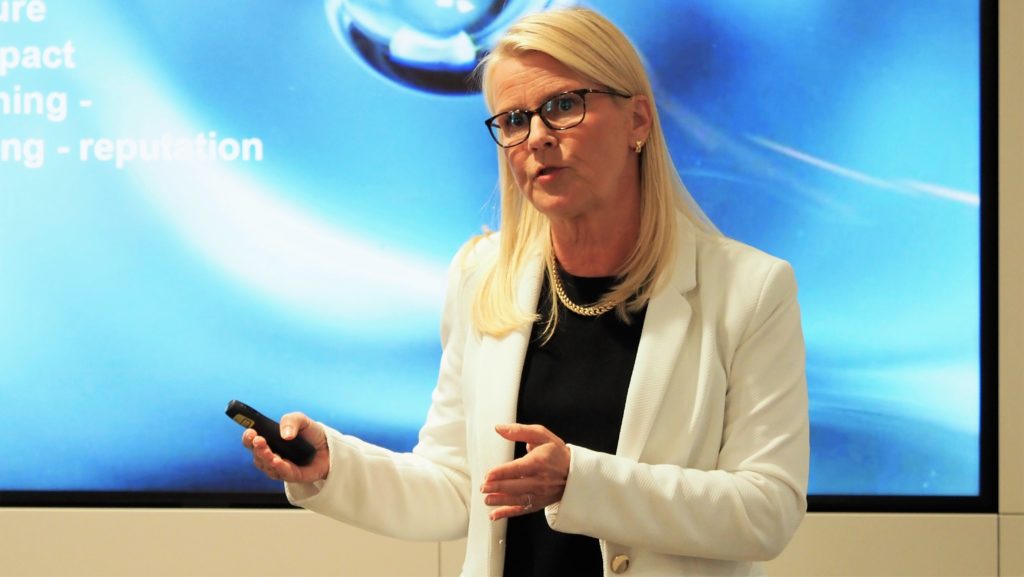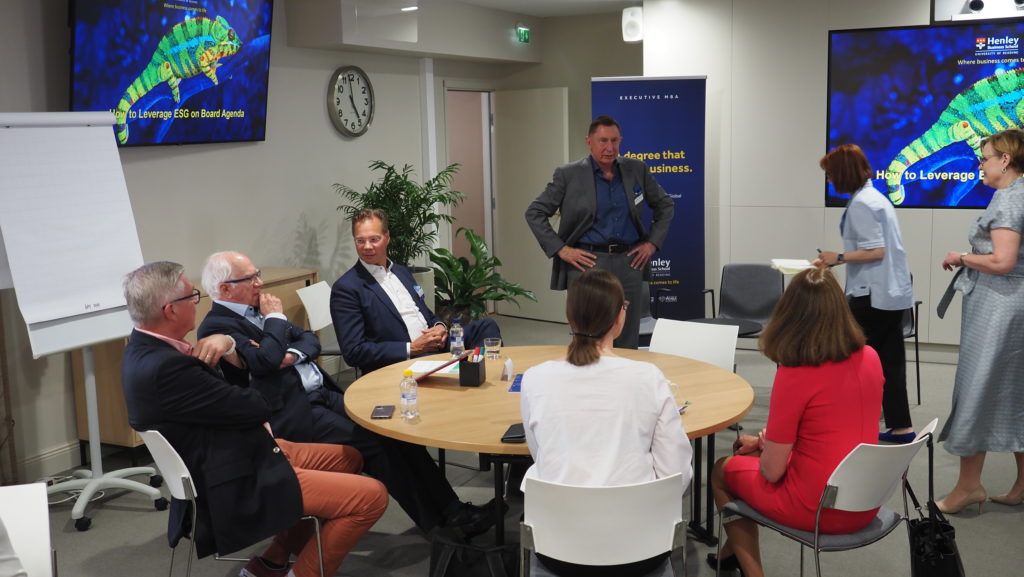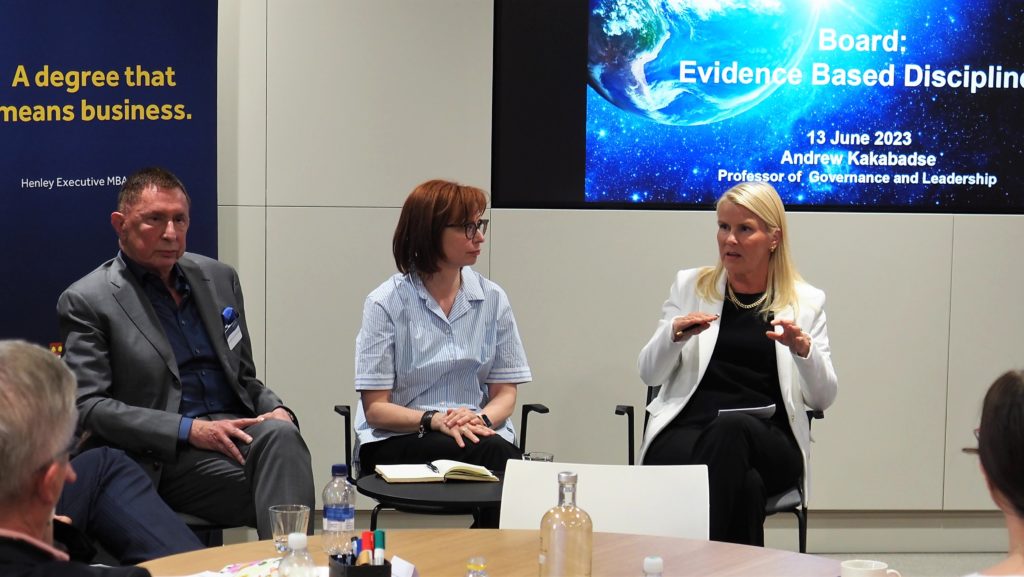DIF x Henley Business School event, titled ”How to Leverage Sustainability in the Board Agenda”, was held on June 13th. Annu Matula, Managing Director of Henley Business School Finland, delivered the opening remarks. The presenters and panelists included Minna Aila (EVP, Sustainability and Corporate Affairs, Neste), Terhi Koipijärvi (Senior Advisor, Sustainability and Strategy, Miltton), and Andrew Kakabadse (Professor of Governance and Leadership, Henley Business School). Dr. Paula Kilpinen from Henley facilitated the discussion, and DIF´s closing remarks were provided by Jorma Eloranta.

Sustainability vs. ESG
Aila began her presentation by clarifying the distinction between sustainability and ESG, emphasizing the ”what” and ”how” aspects. She highlighted that ESG represents the ”how” component: the license to operate. Sustainability is, however, a much broader concept.
Boards should contemplate whether they are operating in a sustainability-driven business (with sustainability at the core of their strategy) or if they are conducting their business in a sustainable, future-proof manner.
While corporations are part of the ongoing societal transformation, they are not necessarily well-equipped to handle the ”S” topics. There are no dedicated ”moral judgment departments” or governance structures specifically addressing social themes.
Boards need to examine and better prepare for societal issues proactively.
From Voluntary to Mandatory: The Shift Towards Sustainable Compliance and Transparency
Sustainability issues have evolved from voluntary practices to regulatory requirements and further into mandatory compliance. Gaining a competitive advantage through sustainability is no longer the prevailing trend.
Sustainability-related matters have become subject to legal obligations, with heightened stakeholder expectations. Transparency is now expected: companies must adopt a proactive, transparent approach.
What Should Boards Do?
Boards should focus on the most critical aspects, set targets, and concentrate on impact.
In the short term, focus on compliance, reporting, processes, policies, and risk mitigation. In the medium term, prioritize value creation, innovation, business opportunities, and partnerships. In the long term, adopt a strategic approach, considering megatrends, vision, resilience-building, and future-proofing the business.
Boards must contemplate their contributions to the world and society. They need to assess whether sustainability is already integrated into their business or determine if a transformation is necessary. The simultaneous task of running and reinventing the company requires extensive board discussions.
”In the era of relentless change, a company survives and thrives based not on its size or performance at any given time but on its ability to reposition itself to create a new future.” – A Harvard study


The Fundamental Question: What Is the Environmental Impact?
Koipijärvi provided insights into sustainability from an environmental perspective (”E” angle). She emphasized that sustainability requires patience, time, and financial investment.
After years of voluntary practices and reporting, there has been a shift toward binding legislation. Sustainability requirements now arise not only from regulations and stakeholders but also from the rapidly changing business environment and increasing global uncertainties.
The business environment is undergoing significant changes. Companies need to identify trends, develop resilience, and respond accordingly. The fundamental question within the ”E” angle of sustainability is: What is the environmental impact?
The evolution of sustainability can be summarized as follows:
- From emissions reduction to mission-driven companies
- From compliance to leadership and value creation
- From shareholder value to stakeholder impact
Strategic Sustainability Starts with Leadership
Companies and boards must reflect on their purpose and strategy. Data and its integration play a significant role in leading sustainability efforts. Corporate culture and leadership are paramount. Leadership culture influences employee experience and value creation.
Regarding sustainability, boards need to:
- Understand the big picture
- Focus on building capabilities
- Understand stakeholders
- Prepare for key regulatory changes


Focus on Ensuring Strong Strategy Delivery
Kakabadse based his presentation on international studies.
Most companies feel overwhelmed and seek assistance understanding and handling current trends, topics, challenges, and disruptions, such as AI, cybersecurity, and sustainability. Only a minority of companies have a disciplined approach to comprehending these trends and their implications for the business.
Board´s focus should shift from creating strategies to ensuring strategy delivery (20/80).
Chairs of the boards should play an active, strong role in requesting data and numbers related to strategy implementation. Chairs must work closely with the CEO and management in a disciplined, analytical manner. Also, it is essential to establish a shared understanding of expectations.
It is suggested that boards actively seek and stay informed through real data and evidence, not rely only the CEO´s data at board meetings.
About Trust
Questions about trust and the board’s role in Nordic countries were raised at the panel discussion.
Is it necessary to obtain data from sources outside the boardroom? If trust exists, the board taking a more active role is not a problem. However, roles and responsibilities must be clear, and the CEO must be informed. Trust in the CEO is continuously earned.
Regarding sustainability, more comparable data is needed.
Closing Remarks
Eloranta emphasized that, based on his experience, the CEOs have provided unedited information on the company´s actual state. He did not see a problem trusting the CEO’s information and clarified the Nordic corporate governance framework.
At the board level, sustainability means considering which businesses the company can and wants to be involved in and where to invest. If sustainability is not genuinely integrated into the company’s strategy and business, it becomes meaningless: ”It is nothing, nonsense.”
Boards must ensure that management possesses the competence and capabilities in sustainability. Cultural change, however, takes time.














